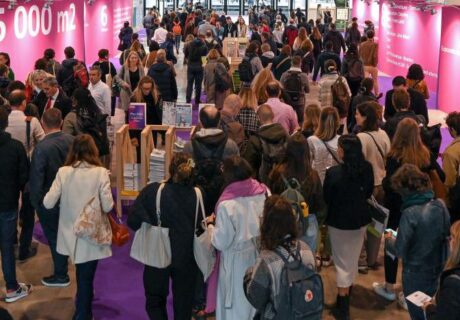4 Mins Read
French biotech startup Amatera, which develops non-GMO, climate-friendly perennial plants using crop genetics technology, has closed a €1.5M pre-seed funding round to speed up production of its regulatory-compliant coffee varieties.
Climate change is destroying coffee – literally. Arabica, one of the two main species of coffee consumed globally (the other being robusta), could go extinct by 2050. In fact, of the 124 known coffee species, 75 (60%) are under threat of extinction. Additionally, land suitable for growing coffee – a ‘belt’ that lies between the tropics – is set to be halved by mid-century too.
These are troubling numbers for one of the world’s favourite beverages, and it goes the other way too. Coffee is one of the highest-emitting foods, topped only by dark chocolate and red meats like lamb, mutton and beef. And in terms of emissions per 1,000 kcal, coffee ranks top of the list – even higher than beef.
According to Our World in Data, in terms of carbon opportunity costs – “the amount of carbon lost from native vegetation and soils in order to produce each food” – coffee only comes behind meats like sheep, goat, beef and buffalo, and cocoa beans. And that’s before you factor in the crop’s problematic supply chain ethics.
Enter Amatera, which develops a non-GMO breeding platform optimised for perennial crops to accelerate the selection and crossing of plants by “pushing the boundaries of in vitro culture”.
An evergreen coffee crop
“Coffee is under threat, but today it can take more than 20 years to create a new coffee variety with conventional breeding techniques,” says Amatera CEO Omar Dekkiche. The biotech startup, which is using molecular biology to create climate-resilient crops from plant cell cultures, is expanding its platform to create perennial coffee varieties four to five times faster than traditional coffee.
These include the Robustica, which combines the enhanced flavour profile of arabica with the higher yield of robusta. It’s developing an arabica variety that’s naturally caffeine-free too, which Dekkiche says “saves a huge amount of time, money and energy, as the standard way to decaffeinate coffee is by rinsing beans with chemical solvents”.
Founded in 2022, Amatera has now raised €1.5M to accelerate the development of crops that can withstand deforestation, crop diseases, and climate change effects. The round was led by PINC, the VC arm of food and drink giant Paulig, with additional participants including Exceptional Ventures, Mudcake, Joyance Partners, AgFunder, and several biotech entrepreneurs (like Gourmey‘s Nicolas Morin-Forest).
“We love the disruptive potential and versatility of the platform since it can be used on several crops,” said Marika King, head of PINC. “Coffee has traditionally not received as much research and innovation as many other crops globally, and as coffee is one of Paulig’s core products, we are of course happy that Amatera’s first solution involves coffee.”
Non-GMO genome editing
Amatera’s process accelerates the natural evolution of a plant by identifying cell lines that have matured the way its scientists want, but through a non-GMO route to genome editing – this means it doesn’t require regulatory approval to sell the crops commercially. “The technology as such is not new, but applying it to perennial crops such as coffee is, since they are more complicated and require several breakthroughs in cell biology, explains CTO Lucie Kriegshauser.
“This is also why gene-editing techniques are struggling. Our technology is a real game-changer and opens up the avenue to applying it on several other crops, such as cacao, bananas and grapes or even pharmaceutical plants,” she adds.
The startup aims to complete its cellular developments in 2024 before it begins producing beans in the field, with a first harvest expected in 2027. It plans to operate in a B2B model, licensing coffee varieties to coffee traders and developing new varieties in collaboration with large food companies.
“Our discussions with trading houses and customers show huge interest,” added King. “It is still early days, but the team and its partners are world-class, and we are very excited to see what they can do.”
Similarly, Starbucks recently created six new arabica coffee tree varietals resilient to the impact of climate change, which it’s giving away to farmers for free. “These varietals were developed over a decade of research and testing by the Starbucks agronomy team. They are naturally resistant to diseases like coffee leaf rust [and] some of the impacts of climate change, and were also selected for their excellent taste and high yield,” a company spokesperson told Green Queen. “We believe our varietals programme is key to a healthy supply of coffee and our business for the next 50 years.”
There are also a host of startups innovating with various ingredients to develop coffee alternatives, in a space termed ‘beanless coffee’. These include Atomo, Minus Coffee (both of which make ‘molecular’ cold brew), Zero Coffee (which will unveil a sparkling coffee beverage) and Northern Wonder (which makes capsules and ground filter coffee). Meanwhile, Parisian food tech firm Stem is developing mass-produced cell-cultured coffee, making use of byproducts like spent coffee and upcycled cherry pulp (cascara).
The post Climate-Resilient Coffee: Meet Amatera, The French Startup That Raised €1.5M to Accelerate Its Perennial Crop Tech appeared first on Green Queen.





